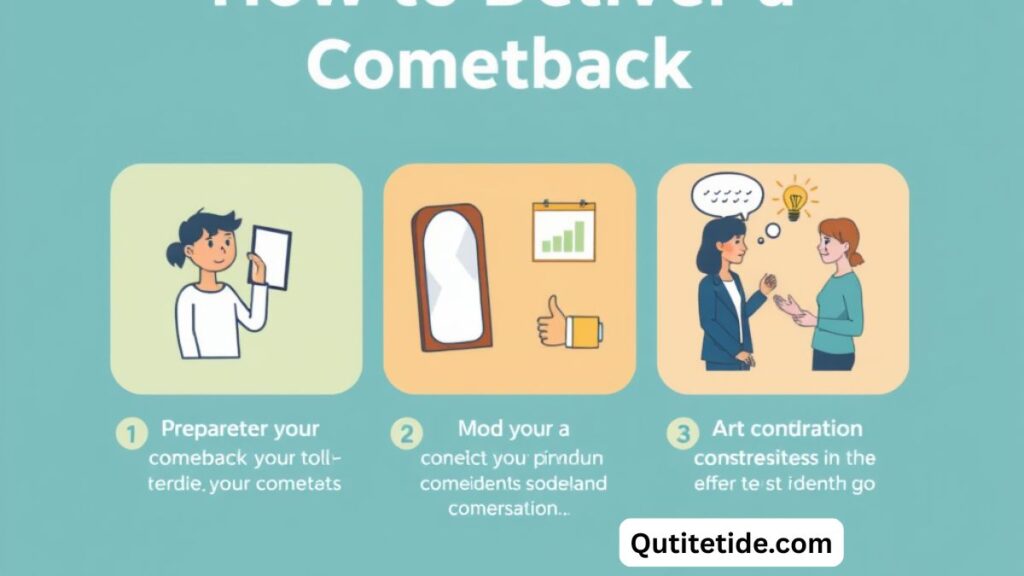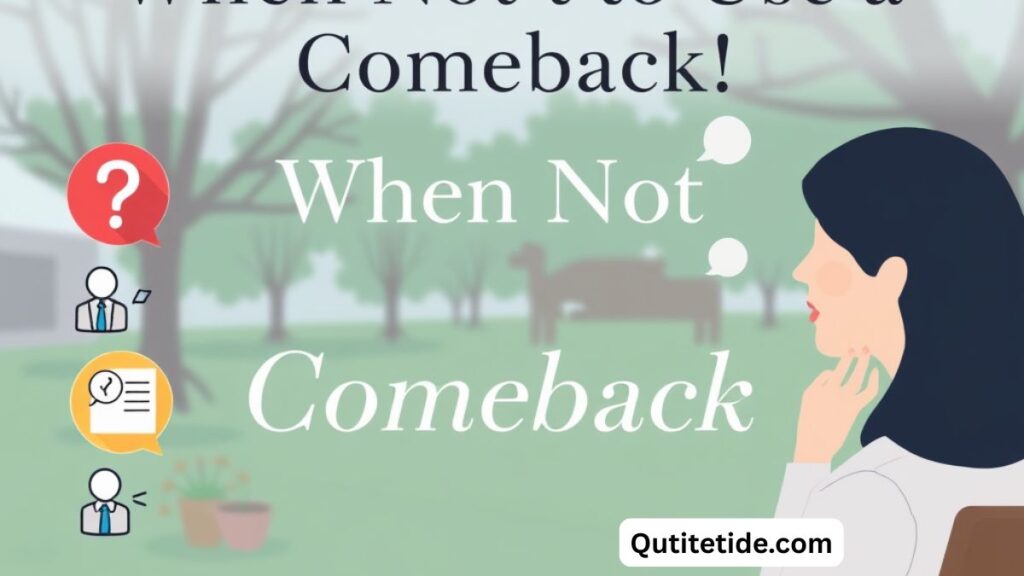Best Comebacks to Shut Someone Up are sharp, clever responses designed to end uncomfortable conversations or shut down unwanted remarks. These comebacks are more than just witty retorts; they can be powerful tools to regain control of a situation and assert yourself confidently. Whether you’re dealing with rude comments, unsolicited advice, or a sarcastic remark, the right comeback can silence even the most persistent individuals.
Imagine the satisfaction of shutting down a conversation with a single, well-timed phrase that leaves everyone around you in awe. It’s not just about proving a point; it’s about handling tension with style, leaving no room for further discussion. A smart, well-delivered comeback can turn a frustrating moment into a demonstration of your quick wit and self-assurance.
Mastering the best comebacks to shut someone up is an art that blends confidence, humor, and tact. When used correctly, these comebacks can save you from unnecessary arguments, boost your social presence, and protect your peace of mind. With the right approach, you’ll not only silence the person trying to get under your skin but do so in a way that commands respect.
The Power of a Perfect Comeback

Before diving into the specifics of how to craft the best responses, let’s take a moment to discuss why having a great comeback is essential in some social situations. Witty comebacks are more than just about having the last word—they’re tools of social defense that allow you to regain control in uncomfortable moments. Best comebacks to shut someone up. A clever comeback allows you to shut down a conversation or shut someone up without escalating conflict.
Confidence in Social Situations
Having a witty response on standby can give you confidence in dealing with difficult people. Overconfidence, arrogance, or ignorance in conversations can often feel like an attack. Instead of getting emotionally involved or retaliating with anger, using a sharp comeback allows you to respond with calm assertiveness. It helps you regain control over the conversation and put the other person in their place without being disrespectful.
Handling Disrespect and Rude Remarks
One of the most common situations where you might need a sharp response is when someone makes a rude remark. Whether it’s an offensive comment, a disrespectful remark, or a bad attitude from a friend, colleague, or even a stranger, it can be difficult to know how to respond without sounding aggressive or overly sensitive. Best comebacks to shut someone up.That’s where a smart comeback comes in handy. It allows you to express your discontent in a way that maintains your dignity and prevents the conversation from spiraling into conflict.
Dealing with Unsolicited Advice
Another classic situation where a comeback is useful is when someone offers you unsolicited advice. Whether it’s a free opinion, unnecessary feedback, or an irrelevant statement, people love to share their views—even when they’re not asked for them. A witty retort can instantly dismiss their advice without seeming rude, telling them that their input is not needed.
The Art of Silence
Finally, there’s the power of silence. Sometimes, the most effective way to shut someone up is not to say anything at all. Mastering the art of remaining silent can be more powerful than any comeback. Your silence speaks volumes about your self-respect and composure, showing that you’re too self-assured to engage with irrelevant remarks. A calm, controlled silence can make the other person feel uncomfortable, and that alone can shut them down.
The Psychology of a Comeback

Before we dive into specific examples of funny comebacks, it’s important to understand the psychology behind a successful comeback. There’s more to it than just the words you use—it’s about timing, tone, and delivery.
Timing
The timing of your comeback is crucial. A comeback delivered too early may not have the desired effect, and one delivered too late may lose its impact. Best comebacks to shut someone up. It’s essential to wait for the right moment—when the other person has finished speaking or when their words are clearly causing tension. A well-timed sarcastic retort or witty comeback can instantly shift the energy of the conversation.
Tone
The tone you use when delivering your sharp remark matters greatly. A witty response should not sound too harsh or angry; rather, it should be delivered with the right level of humor or assertiveness. A tone of calm confidence often works best, signaling that you’re not emotionally affected by the person’s comment. Best comebacks to shut someone up Sarcasm can also be effective if used correctly, but it should be playful rather than mean-spirited.
Body Language
Body language plays a major role in how your comeback is received. Standing tall with open posture signals confidence, while crossing your arms or looking down can make you appear defensive. When delivering a sarcastic retort or a clever response, maintain eye contact and keep your posture relaxed but confident. This reinforces your message and asserts your dominance in the conversation.
Disengagement
Sometimes, the best way to deal with someone who won’t stop talking is to simply disengage. If they continue to make irrelevant remarks or offer unsolicited advice, disengaging from the conversation altogether can be incredibly effective. You can politely excuse yourself, change the subject, or simply walk away. This tactic signals that you have better things to do than engage with someone who doesn’t respect your boundaries.
Top Comebacks to Shut Someone Up

Now that we’ve covered the psychology behind a great comeback, let’s dive into specific sharp comebacks you can use in different social situations. From rude comments to unsolicited advice, here’s a curated list of some of the best comebacks to shut someone up without causing unnecessary conflict.
Witty Comebacks
- “I’m sorry, I didn’t realize you were an expert on my life.”
This is a perfect witty comeback when someone tries to give you advice on how to live your life, especially if they have no right to do so. It puts them in their place without being overly rude. - “Does talking like that make you feel better?”
A sarcastic response that addresses the inconsiderate nature of the other person’s comments. It calls out their behavior without escalating the conversation. - “Oh, I didn’t know you had a degree in everything.”
When someone is acting like they know it all, this clever comeback highlights their overconfidence in a light-hearted way. It’s a playful jab that reminds them of their arrogance. - “It must be exhausting, knowing everything about everything.”
A humorous comeback for those who think they have all the answers. It adds a touch of sarcasm, pointing out how tiring it must be to live with such self-importance. - “You sound better when you’re quiet.”
A classic sarcastic response that politely tells someone they should stop talking. It’s effective when someone is ranting or being overly talkative. - “I’ll consider that when I’m taking advice from someone I respect.”
This comeback politely dismisses someone’s unsolicited advice by pointing out that their opinion doesn’t hold much weight.
Clever Comebacks
- “I’d agree with you, but then we’d both be wrong.”
This sharp comeback is perfect when someone is pushing an opinion you know is wrong. It lets them know that their view is invalid while maintaining a sense of humor. - “Please, keep talking. I always yawn when I’m interested.”
A funny comeback that uses humor to express your boredom with their speech. It’s playful and makes your disinterest clear without being rude. - “Are you done, or is there more to your little speech?”
A sharp remark that calls attention to someone’s unnecessary talking. It signals that you’ve had enough of their commentary without being overly aggressive. - “I’m sure you’ll find someone who cares, eventually.”
A witty retort for when someone’s opinion is irrelevant. It dismisses their words without being mean-spirited, while still asserting your disinterest. - “Your opinion is like a broken pencil—pointless.”
A clever comeback for when someone offers unnecessary comments. This one hits them where it hurts while keeping the tone light and humorous. - “I’m sure that was meant to be profound, but it just wasn’t.”
A sarcastic comeback for when someone thinks they’ve said something clever but it falls flat. It’s a subtle way of showing them that their words didn’t impress you.
Responses to Overconfidence
- “You should probably stop talking before you embarrass yourself.”
A confident response that lets someone know they’re crossing a line. This works well for people who are speaking without thinking or acting arrogantly. - “Wow, you sure know how to waste everyone’s time.”
A sharp response when someone is rambling or talking about irrelevant matters. It dismisses their speech without sounding too confrontational. - “Bless your heart. That was almost an opinion.”
This witty comeback highlights the fact that their opinion was poorly thought out or irrelevant. It’s playful but makes your disinterest clear. - “I’ve seen vegetables with more brains than you.”
A sarcastic response that targets someone’s lack of intelligence in a humorous way. It’s a clever way to shut down their comments without being overly rude. - “Your level of self-confidence is impressive… and misplaced.”
This one combines sarcasm with a subtle jab at someone’s overconfidence. It points out their arrogance while still maintaining a sense of humor.
Funny Comebacks
- “I’ll let you know when I start caring.”
A funny comeback that makes it clear you’re not interested in the person’s opinion. It’s direct, but humorous. - “That was a great story, but too bad nobody asked for it.”
This witty comeback cuts off a person’s unnecessary storytelling. It’s a humorous way to let them know that their tale is not interesting. - “I’d listen to you, but I have better things to do—like anything else.”
A playful comeback that expresses your complete disinterest in the conversation. It’s humorous but makes your point clear. - “Are you finished, or should I bring popcorn for the show?”
This one adds a humorous twist to a long-winded person. It tells them that their rant is being treated as entertainment. - “You should put that on a t-shirt because nobody cares.”
A sharp remark that dismisses someone’s words with humor. It’s a great way to show you’re not bothered by their irrelevant comments.
When Silence is the Best Response
While comebacks can be fun and effective, sometimes saying nothing at all can be the most powerful move you can make. When someone is speaking out of turn, you don’t always need to respond with a sarcastic remark or witty comeback. Instead, you can choose to remain silent, allowing the other person to realize that their words aren’t getting through to you.
The Power of Silence
Remaining silent sends a strong message. It shows that you’re not bothered by their unsolicited feedback or rude comment. Your silence tells them that you don’t need to engage in their argument and are confident enough to ignore their remarks.
Walking Away
If the conversation becomes too frustrating or the person continues to make offensive comments, simply walking away is often the best course of action. Leaving the conversation shows that you refuse to engage with people who don’t respect your boundaries.
Why You Need a Great Comeback

A great comeback isn’t just a clever response—it’s an essential tool for managing social dynamics and protecting your personal space. Life is filled with moments where people will make rude remarks, offer unsolicited advice, or simply cross boundaries. Having a sharp comeback allows you to navigate these situations with confidence, without escalating conflict. Here’s why having one is so crucial:
- Regains Control: When someone tries to dominate a conversation with unwanted comments or overbearing opinions, a well-timed witty comeback shifts the power back to you. It lets you assert control in a situation where you might otherwise feel helpless.
- Preserves Your Dignity: In moments of tension, responding with a sarcastic remark or a clever response allows you to stand your ground without resorting to anger or aggression. It shows that you’re not bothered by disrespectful remarks but instead can respond with grace.
- Defends Against Disrespect: Whether it’s someone with a bad attitude, arrogance, or ignorance, having a smart response ensures you don’t let rude comments slide without addressing them. A sharp comeback makes it clear that such behavior won’t go unnoticed.
- Encourages Positive Communication: Instead of engaging in a heated argument, a witty comeback can diffuse tension while subtly redirecting the conversation. It keeps the tone light but still conveys that you’re not willing to engage with irrelevant opinions or unnecessary commentary.
- Boosts Confidence: Having a quick, funny comeback ready boosts your self-assurance in social settings. It shows that you don’t feel threatened by others’ words and reinforces your social confidence.
In short, a great comeback isn’t just about shutting someone up—it’s about asserting your boundaries, protecting your self-respect, and ensuring that your voice is heard, all while maintaining control of the conversation with humor and sharp wit.
How to Deliver a Comeback Effectively

Delivering a comeback is more than just having the right words—it’s about how you present them. The way you deliver a sharp comeback, sarcastic remark, or witty response can make all the difference in how it’s received. If you want your words to have maximum impact without creating unnecessary conflict, it’s essential to use the right approach. Here’s how to deliver a comeback effectively:
1. Timing is Everything
The first rule of a successful comeback is timing. Delivering a response at the wrong moment can make your remark fall flat. Wait until the other person has finished speaking, then strike with your response. Timing shows confidence, and it also allows the comeback to stand out in the conversation. If you interrupt too soon, it might seem aggressive or rude, and the other person could turn the tables on you.
Example:
If someone offers you unsolicited advice in the middle of a conversation, wait for a natural pause before responding. This ensures your comeback is heard without the risk of being drowned out.
2. Maintain a Calm Tone
Your tone can be just as powerful as the words you use. When delivering a witty comeback, aim for a calm, collected tone. If you sound angry or overly defensive, your response could escalate the situation rather than diffuse it. A sarcastic retort or sharp remark should come off as playful or confident, not hostile. This helps you remain in control of the situation without appearing like you’re too emotionally invested in the argument.
Example:
If someone makes a disrespectful remark, saying something like “Wow, I didn’t realize you were an expert on everything” with a slight smile conveys a lighthearted attitude. It makes it clear that you’re not taking them seriously but without getting drawn into a confrontation.
3. Use Your Body Language
Your body language plays a crucial role in how your comeback is perceived. Stand tall with open posture to show confidence. Avoid crossing your arms or looking down, as these signals can make you appear defensive or insecure. Best comebacks to shut someone up. When delivering a comeback, maintain eye contact and use facial expressions to match the tone of your response. A raised eyebrow or a smirk can add an extra layer of impact to your sharp comeback.
Example:
If someone is rambling on with unnecessary commentary, respond with a raised eyebrow and a sarcastic remark, such as “That’s cute, but nobody cares.” Your body language reinforces your self-assured response without needing to say much more.
4. Keep It Brief
The best comebacks are often short and sweet. Long-winded responses can lose their impact and give the other person a chance to jump back into the conversation. A concise comeback makes your point clearly and leaves little room for them to argue. You don’t need to over-explain yourself; sometimes, a few well-chosen words are all it takes to shut someone down.
Example:
When someone is offering unwanted advice, simply saying, “Thanks for your input, but I’ve got this” is direct, polite, and gets the message across without dragging out the conversation.
5. Be Playful, Not Aggressive
While you want your comeback to be effective, you also want to avoid sounding overly aggressive. Witty remarks should be fun and playful, not mean-spirited. If your comeback feels like an insult, it can escalate the situation and lead to unnecessary conflict. Keep the mood lighthearted but firm, and you’ll likely get a much better response.
Example:
If someone makes a rude comment, saying “Wow, that was almost an opinion” with a smile softens the blow. It keeps things playful while still asserting your boundaries.
6. Use Humor to Disarm
Humor is one of the most powerful tools in delivering a comeback. When you use humor, you disarm the other person’s negative energy and redirect the conversation in a more positive direction. Best comebacks to shut someone up. A funny comeback can lighten the mood and show that you’re not intimidated by their rude remarks. However, make sure the humor doesn’t go too far—don’t make jokes at the expense of the other person’s dignity.
Example:
If someone offers unsolicited advice that’s clearly out of place, a humorous response like, “I’ll let you know when I start caring” shows you’re not interested without being confrontational.
7. Stay Confident
Confidence is key when delivering a comeback. If you sound unsure or hesitant, your words might lose their power. Stand firm in your response, even if it’s just a brief sentence. By keeping a confident tone, you show that you are comfortable with yourself and your opinions, regardless of what others might say.
Example:
If someone challenges your point of view, responding with, “I’d agree with you, but then we’d both be wrong,” displays confidence in your beliefs while still keeping the conversation light.
8. Know When to Walk Away
Sometimes the most effective comeback is to simply walk away. If the conversation is becoming too heated or the other person continues to make offensive comments, leaving the situation can be the best choice. This tactic allows you to maintain control over the conversation without sinking into a pointless argument. In fact, disengaging with a person who isn’t worth your time can speak volumes about your own self-respect.
Example:
If someone is being particularly argumentative or disrespectful, a simple, “I don’t have time for this,” and walking away signals that you value your time more than engaging in a toxic discussion.
9. Use Silence When Necessary
In some situations, silence is the most powerful response. When someone is trying to provoke a reaction, choosing not to respond at all can be a way of shutting them down. Silence forces the other person to reflect on their words and often makes them uncomfortable. It’s an effective strategy when you don’t want to engage but still want to make a point.
Example:
Someone continues to make irrelevant statements, simply staying quiet and looking at them with raised eyebrows can convey your disapproval without uttering a word.
When Not to Use a Comeback

While comebacks can be incredibly effective in shutting someone down or asserting your boundaries, there are definitely times when using one might not be the best option. Knowing when not to deliver a comeback is just as important as knowing when to use one. Timing, context, and the nature of the situation all play a role in determining whether or not a sharp comeback is appropriate. best comebacks to shut someone up. Here are some situations when it’s better to hold back on a witty retort or sarcastic remark:
1. When It Could Escalate Conflict
The primary purpose of a comeback is to regain control of a conversation or diffuse tension. However, if the person you’re dealing with is already in an argumentative or aggressive state, your comeback may escalate the situation. In these cases, responding with a sarcastic remark could ignite further hostility, leading to unnecessary conflict.
If you sense that your response might provoke more anger, it’s often best to stay quiet or calmly disengage. A witty comeback may only fuel the fire, making the situation worse instead of better.
Example:
If someone is yelling or being extremely emotional, even a clever comeback like “Wow, that’s a great story, but nobody asked for it” can come off as condescending and might make the person even angrier. In this case, it’s better to give them space or calmly say, “Let’s talk about this later.”
2. In Professional or Formal Settings
In more formal settings, such as the workplace, meetings, or formal events, comebacks can be risky. You don’t want to come across as unprofessional or disrespectful to colleagues, superiors, or clients. best comebacks to shut someone up. While a sharp retort might be appropriate among friends, it can be seen as inappropriate or even damaging to your professional reputation in a work environment.
Instead of using a sarcastic response in a professional setting, try to handle the situation with tact and diplomacy. A well-thought-out, calm reply that addresses the issue directly will often be more effective than trying to shut someone down with humor.
Example:
If a colleague gives unsolicited feedback in a meeting, responding with a witty comeback like, “Thanks for your ‘helpful’ advice, but I’ve got it covered,” might come across as rude and unprofessional. A better response would be to say, “Thanks for your input, I’ll consider it moving forward.”
When It Could Hurt Someone’s Feelings

A well-timed comeback is meant to be lighthearted, but sometimes, it can inadvertently hurt someone’s feelings. If the person you’re responding to is emotionally vulnerable or sensitive, a sharp remark could damage your relationship with them. best comebacks to shut someone up. It’s important to gauge the person’s emotional state before firing back with a funny response.
If the person is already upset, overwhelmed, or struggling, your sarcasm could come across as dismissive or unkind. In these situations, it’s better to listen, offer support, or simply change the subject rather than using humor as a defense mechanism.
Example:
If a friend is going through a tough time, and they make a comment about their situation, hitting back with something like, “Well, at least it’s not the worst thing that’s ever happened,” might seem dismissive of their feelings. Instead, it’s better to offer empathy and support rather than a comeback.
4. When You Are Trying to Resolve a Conflict
If you’re engaged in a serious conversation or trying to resolve a disagreement, using a witty comeback can derail the conversation and prevent you from getting to a resolution. In these instances, your goal should be to listen, understand, and compromise, not to throw in sarcastic remarks or sharp responses that keep the argument going. best comebacks to shut someone up.
While humor can help diffuse tension in some cases, it shouldn’t be used to sidestep difficult conversations that require honest, thoughtful communication. In fact, using a comeback in the middle of a conflict could be seen as avoiding the issue or belittling the other person’s perspective.
Example:
During a disagreement with a partner, if they express frustration about a particular issue, responding with “I think you’re overreacting” or “Oh, you’re just being dramatic” can shut down productive communication. Instead, it’s better to listen and express your own feelings without trying to dismiss theirs.
5. When It’s Not Necessary to Defend Yourself
In some cases, a comeback is simply not needed. If someone is making unsolicited comments or rude remarks, but their words don’t actually affect you, sometimes the best response is no response at all. Silence can be a powerful way to demonstrate that the person’s words don’t have the power to hurt you. Responding to every little comment with a sarcastic retort can make you seem overly defensive or insecure.
If the person is not being malicious or trying to provoke you, there’s no need to engage. Instead, you can choose to ignore the comment and move on. In some cases, letting someone’s rude comment pass without a comeback sends a stronger message than responding.
Example:
If someone makes a rude comment about your appearance, but it’s clear they’re just being petty, staying silent or simply changing the subject is often a better choice than responding with a witty comeback.
6. When You Are Involved in a Group Discussion or Public Debate
In group settings or debates, comebacks can sometimes undermine the overall discussion. If you’re in a public debate or group discussion, responding to every comment with a sharp comeback can come across as immature or disrespectful. Especially if the conversation is intended to be constructive.
While it’s tempting to use a funny comeback to silence someone you disagree with, it can derail the conversation and prevent progress. In these cases, focus on presenting your own arguments respectfully and listening to others, rather than resorting to sarcastic responses.
Example:
In a classroom debate, if a classmate presents a point you disagree with, using a sarcastic remark like, “Nice try, but that’s a terrible argument” can shut down productive dialogue. A more respectful response would be, “I see your point, but I have a different perspective based on [fact].”
7. When You Want to Maintain Peace
Sometimes, the comeback may not be worth the potential disruption. If you’re in a social situation where everyone is getting along and having a good time, you might want to think twice before responding with a sharp retort or sarcastic remark. Even though it might seem funny in the moment, it could cause unnecessary tension or make others uncomfortable.
If you sense that your comeback could stir up drama or conflict in an otherwise peaceful setting, it might be better to keep quiet and let the conversation flow smoothly. Sometimes, silence or a calm response is more powerful than anything you could say.
Example:
If someone makes a playful jab at you during a friendly gathering, responding with a witty comeback like, “That’s the best you’ve got?” could create awkwardness in the group. Instead, a smile or a light laugh will keep the mood positive without risking any tension.
Conclusion
In conclusion, knowing the best comebacks to shut someone up can be a game-changer in many social situations. It’s not just about silencing someone, but doing it with style and confidence. A well-timed, clever comeback can help you maintain control of a conversation and protect your boundaries. Whether you’re facing rude remarks or unwanted advice, the right response can end the conversation on your terms. best comebacks to shut someone up.
By mastering the best comebacks to shut someone up, you can handle even the most uncomfortable situations with ease. The key is to stay calm, assertive, and use your wit to respond without escalating things. With the right approach, you’ll not only shut down rude comments but also earn respect in the process.
FAQs
1. What are the best comebacks to shut someone up?
The best comebacks are sharp, confident, and witty responses designed to end uncomfortable or rude conversations without escalating the situation.
2. Are comebacks always a good way to handle rude comments?
Not always. It’s important to assess the situation. Sometimes staying silent or walking away can be more effective than responding with a comeback.
3. Can comebacks be disrespectful?
Yes, if not used carefully. The key is to ensure your comeback is clever, not hurtful, and doesn’t escalate the conflict further.
4. How do I make my comeback sound confident?
Deliver it calmly, maintain eye contact, and avoid over-explaining. Confidence comes from a steady tone and controlled body language.
5. Is it okay to use a comeback on unsolicited advice?
Absolutely. If someone offers unsolicited advice, a witty and polite comeback can help assert your boundaries without being rude.

Ashir Been is the owner and admin of QuoteTide, a platform dedicated to providing a rich collection of quotes, messages, and creative texts for various occasions. From motivational quotes to heartfelt wishes and flirty texts, Ashir ensures that QuoteTide remains a go-to destination for expressive and engaging content. With a passion for words and digital creativity, he curates high-quality content to help users effortlessly share their emotions and thoughts.
